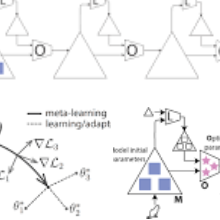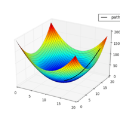Hierarchical methods in reinforcement learning have the potential to reduce the amount of decisions that the agent needs to perform when learning new tasks. However, finding reusable useful temporal abstractions that facilitate fast learning remains a challenging problem. Recently, several deep learning approaches were proposed to learn such temporal abstractions in the form of options in an end-to-end manner. In this work, we point out several shortcomings of these methods and discuss their potential negative consequences. Subsequently, we formulate the desiderata for reusable options and use these to frame the problem of learning options as a gradient-based meta-learning problem. This allows us to formulate an objective that explicitly incentivizes options which allow a higher-level decision maker to adjust in few steps to different tasks. Experimentally, we show that our method is able to learn transferable components which accelerate learning and performs better than existing prior methods developed for this setting. Additionally, we perform ablations to quantify the impact of using gradient-based meta-learning as well as other proposed changes.
相關內容
Meta-Reinforcement Learning (MRL) is a promising framework for training agents that can quickly adapt to new environments and tasks. In this work, we study the MRL problem under the policy gradient formulation, where we propose a novel algorithm that uses Moreau envelope surrogate regularizers to jointly learn a meta-policy that is adjustable to the environment of each individual task. Our algorithm, called Moreau Envelope Meta-Reinforcement Learning (MEMRL), learns a meta-policy that can adapt to a distribution of tasks by efficiently updating the policy parameters using a combination of gradient-based optimization and Moreau Envelope regularization. Moreau Envelopes provide a smooth approximation of the policy optimization problem, which enables us to apply standard optimization techniques and converge to an appropriate stationary point. We provide a detailed analysis of the MEMRL algorithm, where we show a sublinear convergence rate to a first-order stationary point for non-convex policy gradient optimization. We finally show the effectiveness of MEMRL on a multi-task 2D-navigation problem.
Generating explanations for reinforcement learning (RL) is challenging as actions may produce long-term effects on the future. In this paper, we develop a novel framework for explainable RL by learning a causal world model without prior knowledge of the causal structure of the environment. The model captures the influence of actions, allowing us to interpret the long-term effects of actions through causal chains, which present how actions influence environmental variables and finally lead to rewards. Different from most explanatory models which suffer from low accuracy, our model remains accurate while improving explainability, making it applicable in model-based learning. As a result, we demonstrate that our causal model can serve as the bridge between explainability and learning.
The transformer architecture and variants presented remarkable success across many machine learning tasks in recent years. This success is intrinsically related to the capability of handling long sequences and the presence of context-dependent weights from the attention mechanism. We argue that these capabilities suit the central role of a Meta-Reinforcement Learning algorithm. Indeed, a meta-RL agent needs to infer the task from a sequence of trajectories. Furthermore, it requires a fast adaptation strategy to adapt its policy for a new task -- which can be achieved using the self-attention mechanism. In this work, we present TrMRL (Transformers for Meta-Reinforcement Learning), a meta-RL agent that mimics the memory reinstatement mechanism using the transformer architecture. It associates the recent past of working memories to build an episodic memory recursively through the transformer layers. We show that the self-attention computes a consensus representation that minimizes the Bayes Risk at each layer and provides meaningful features to compute the best actions. We conducted experiments in high-dimensional continuous control environments for locomotion and dexterous manipulation. Results show that TrMRL presents comparable or superior asymptotic performance, sample efficiency, and out-of-distribution generalization compared to the baselines in these environments.
What matters for contrastive learning? We argue that contrastive learning heavily relies on informative features, or "hard" (positive or negative) features. Early works include more informative features by applying complex data augmentations and large batch size or memory bank, and recent works design elaborate sampling approaches to explore informative features. The key challenge toward exploring such features is that the source multi-view data is generated by applying random data augmentations, making it infeasible to always add useful information in the augmented data. Consequently, the informativeness of features learned from such augmented data is limited. In response, we propose to directly augment the features in latent space, thereby learning discriminative representations without a large amount of input data. We perform a meta learning technique to build the augmentation generator that updates its network parameters by considering the performance of the encoder. However, insufficient input data may lead the encoder to learn collapsed features and therefore malfunction the augmentation generator. A new margin-injected regularization is further added in the objective function to avoid the encoder learning a degenerate mapping. To contrast all features in one gradient back-propagation step, we adopt the proposed optimization-driven unified contrastive loss instead of the conventional contrastive loss. Empirically, our method achieves state-of-the-art results on several benchmark datasets.
Meta reinforcement learning (meta-RL) extracts knowledge from previous tasks and achieves fast adaptation to new tasks. Despite recent progress, efficient exploration in meta-RL remains a key challenge in sparse-reward tasks, as it requires quickly finding informative task-relevant experiences in both meta-training and adaptation. To address this challenge, we explicitly model an exploration policy learning problem for meta-RL, which is separated from exploitation policy learning, and introduce a novel empowerment-driven exploration objective, which aims to maximize information gain for task identification. We derive a corresponding intrinsic reward and develop a new off-policy meta-RL framework, which efficiently learns separate context-aware exploration and exploitation policies by sharing the knowledge of task inference. Experimental evaluation shows that our meta-RL method significantly outperforms state-of-the-art baselines on various sparse-reward MuJoCo locomotion tasks and more complex sparse-reward Meta-World tasks.
The Q-learning algorithm is known to be affected by the maximization bias, i.e. the systematic overestimation of action values, an important issue that has recently received renewed attention. Double Q-learning has been proposed as an efficient algorithm to mitigate this bias. However, this comes at the price of an underestimation of action values, in addition to increased memory requirements and a slower convergence. In this paper, we introduce a new way to address the maximization bias in the form of a "self-correcting algorithm" for approximating the maximum of an expected value. Our method balances the overestimation of the single estimator used in conventional Q-learning and the underestimation of the double estimator used in Double Q-learning. Applying this strategy to Q-learning results in Self-correcting Q-learning. We show theoretically that this new algorithm enjoys the same convergence guarantees as Q-learning while being more accurate. Empirically, it performs better than Double Q-learning in domains with rewards of high variance, and it even attains faster convergence than Q-learning in domains with rewards of zero or low variance. These advantages transfer to a Deep Q Network implementation that we call Self-correcting DQN and which outperforms regular DQN and Double DQN on several tasks in the Atari 2600 domain.
Pre-training text representations has recently been shown to significantly improve the state-of-the-art in many natural language processing tasks. The central goal of pre-training is to learn text representations that are useful for subsequent tasks. However, existing approaches are optimized by minimizing a proxy objective, such as the negative log likelihood of language modeling. In this work, we introduce a learning algorithm which directly optimizes model's ability to learn text representations for effective learning of downstream tasks. We show that there is an intrinsic connection between multi-task pre-training and model-agnostic meta-learning with a sequence of meta-train steps. The standard multi-task learning objective adopted in BERT is a special case of our learning algorithm where the depth of meta-train is zero. We study the problem in two settings: unsupervised pre-training and supervised pre-training with different pre-training objects to verify the generality of our approach.Experimental results show that our algorithm brings improvements and learns better initializations for a variety of downstream tasks.
Reinforcement learning is one of the core components in designing an artificial intelligent system emphasizing real-time response. Reinforcement learning influences the system to take actions within an arbitrary environment either having previous knowledge about the environment model or not. In this paper, we present a comprehensive study on Reinforcement Learning focusing on various dimensions including challenges, the recent development of different state-of-the-art techniques, and future directions. The fundamental objective of this paper is to provide a framework for the presentation of available methods of reinforcement learning that is informative enough and simple to follow for the new researchers and academics in this domain considering the latest concerns. First, we illustrated the core techniques of reinforcement learning in an easily understandable and comparable way. Finally, we analyzed and depicted the recent developments in reinforcement learning approaches. My analysis pointed out that most of the models focused on tuning policy values rather than tuning other things in a particular state of reasoning.
Meta-reinforcement learning algorithms can enable robots to acquire new skills much more quickly, by leveraging prior experience to learn how to learn. However, much of the current research on meta-reinforcement learning focuses on task distributions that are very narrow. For example, a commonly used meta-reinforcement learning benchmark uses different running velocities for a simulated robot as different tasks. When policies are meta-trained on such narrow task distributions, they cannot possibly generalize to more quickly acquire entirely new tasks. Therefore, if the aim of these methods is to enable faster acquisition of entirely new behaviors, we must evaluate them on task distributions that are sufficiently broad to enable generalization to new behaviors. In this paper, we propose an open-source simulated benchmark for meta-reinforcement learning and multi-task learning consisting of 50 distinct robotic manipulation tasks. Our aim is to make it possible to develop algorithms that generalize to accelerate the acquisition of entirely new, held-out tasks. We evaluate 6 state-of-the-art meta-reinforcement learning and multi-task learning algorithms on these tasks. Surprisingly, while each task and its variations (e.g., with different object positions) can be learned with reasonable success, these algorithms struggle to learn with multiple tasks at the same time, even with as few as ten distinct training tasks. Our analysis and open-source environments pave the way for future research in multi-task learning and meta-learning that can enable meaningful generalization, thereby unlocking the full potential of these methods.



